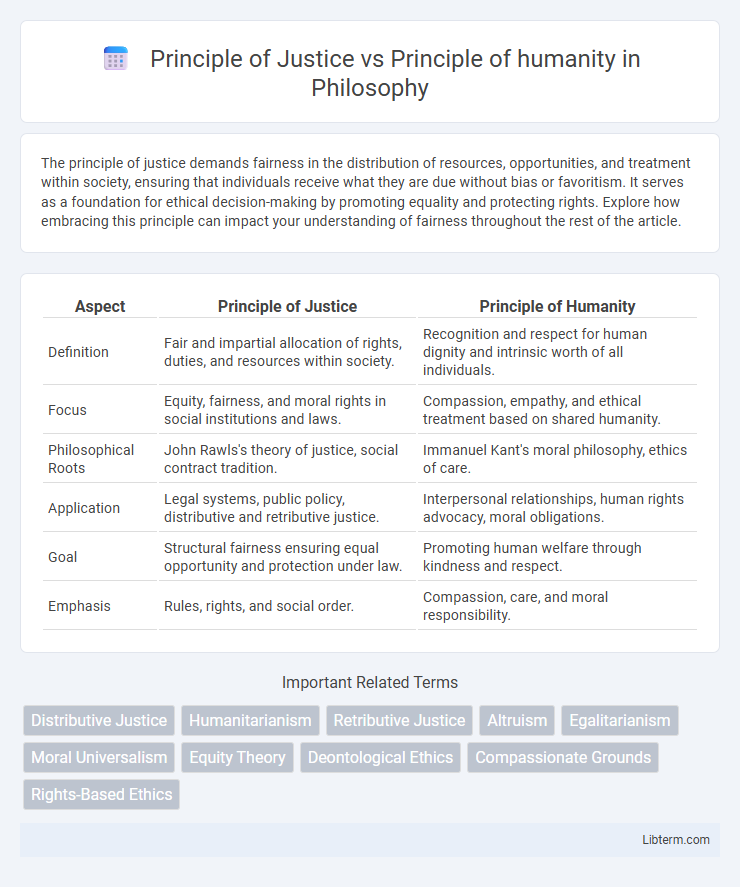The principle of justice demands fairness in the distribution of resources, opportunities, and treatment within society, ensuring that individuals receive what they are due without bias or favoritism. It serves as a foundation for ethical decision-making by promoting equality and protecting rights. Explore how embracing this principle can impact your understanding of fairness throughout the rest of the article.
Table of Comparison
| Aspect | Principle of Justice | Principle of Humanity |
|---|---|---|
| Definition | Fair and impartial allocation of rights, duties, and resources within society. | Recognition and respect for human dignity and intrinsic worth of all individuals. |
| Focus | Equity, fairness, and moral rights in social institutions and laws. | Compassion, empathy, and ethical treatment based on shared humanity. |
| Philosophical Roots | John Rawls's theory of justice, social contract tradition. | Immanuel Kant's moral philosophy, ethics of care. |
| Application | Legal systems, public policy, distributive and retributive justice. | Interpersonal relationships, human rights advocacy, moral obligations. |
| Goal | Structural fairness ensuring equal opportunity and protection under law. | Promoting human welfare through kindness and respect. |
| Emphasis | Rules, rights, and social order. | Compassion, care, and moral responsibility. |
Defining the Principle of Justice
The Principle of Justice emphasizes fairness in distributing resources, rights, and responsibilities within society, ensuring equal treatment and equitable opportunities for all individuals. It establishes that benefits and burdens should be allocated based on merit, need, or contribution, preventing discrimination and social inequality. This principle contrasts with the Principle of Humanity, which centers on compassion, dignity, and respect for human life, focusing on alleviating suffering and promoting human welfare.
Understanding the Principle of Humanity
The Principle of Humanity emphasizes respect for human dignity and the alleviation of suffering, prioritizing compassionate actions that safeguard individual well-being. This principle guides ethical decision-making by promoting empathy and the protection of fundamental human rights in all circumstances. Understanding the Principle of Humanity highlights the moral obligation to treat others with kindness and fairness, even in complex social or legal contexts.
Historical Roots of Justice and Humanity
The Principle of Justice, deeply rooted in ancient legal systems such as Hammurabi's Code and Aristotle's ethics, emphasizes fairness, rights, and the equitable distribution of benefits and burdens within society. The Principle of Humanity originates from Enlightenment thought and humanitarian movements, focusing on compassion, respect for human dignity, and the intrinsic value of individuals beyond legal rights. Both principles evolved through historical struggles for social order and moral progress, shaping modern frameworks for human rights and ethical governance.
Key Philosophers and Theories
The Principle of Justice, rooted in the works of John Rawls, emphasizes fairness and the equitable distribution of resources through his theory of justice as fairness. In contrast, the Principle of Humanity, influenced by Immanuel Kant, centers on respecting human dignity and moral autonomy, advocating that individuals should be treated as ends in themselves. These contrasting principles highlight justice-focused theorists like Rawls and humanity-centered philosophers like Kant, shaping ethical frameworks in political philosophy and moral theory.
Justice in Law and Society
The Principle of Justice in law emphasizes fairness, equality, and impartiality in the application of legal rules to ensure social order and protect individual rights. It mandates that laws be enforced consistently, addressing grievances through an objective framework that balances societal interests and individual freedoms. Contrastingly, the Principle of Humanity centers on compassion and dignity, often influencing legal interpretations to humanize justice without compromising legal integrity.
Humanity in Ethics and Morality
The Principle of Humanity in ethics and morality emphasizes respect for human dignity, compassion, and the intrinsic worth of individuals, guiding actions that promote well-being and alleviate suffering. Unlike the Principle of Justice, which centers on fairness, rights, and equitable distribution, the Principle of Humanity prioritizes empathy and moral consideration in interpersonal relationships. Ethical frameworks grounded in humanity advocate for kindness and care as fundamental to moral decision-making and social harmony.
Comparing Justice and Humanity
The Principle of Justice emphasizes fairness, equality, and the impartial distribution of rights and resources within a society to ensure social order and legal equity. In contrast, the Principle of Humanity centers on compassion, empathy, and the intrinsic value of human dignity, prioritizing kindness and moral responsibility toward others. While justice seeks structured fairness often through laws and policies, humanity advocates for ethical treatment grounded in emotional understanding and care.
Conflicts Between Justice and Humanity
Conflicts between the Principle of Justice and the Principle of Humanity arise when strict adherence to legal fairness clashes with compassion for individual suffering. Justice emphasizes impartiality, rights, and equality under the law, while Humanity prioritizes mercy, empathy, and moral consideration for vulnerable persons. These tensions often manifest in legal and ethical dilemmas where upholding the law may result in harsh outcomes lacking humane sensitivity.
Real-world Applications and Case Studies
The Principle of Justice emphasizes fair distribution of resources and equal treatment, evident in legal systems ensuring impartial trials and social policies addressing income inequality. The Principle of Humanity prioritizes compassion and alleviation of suffering, guiding humanitarian aid initiatives and refugee support programs worldwide. Case studies highlight how balancing both principles in healthcare allocation improves equity while maintaining empathetic patient care.
Striking a Balance: Integrating Justice and Humanity
Striking a balance between the Principle of Justice and the Principle of Humanity requires integrating fairness with compassion in decision-making processes. Justice emphasizes equality, rights, and impartiality, while humanity prioritizes empathy, care, and alleviation of suffering. Effective policies and actions blend these principles by ensuring equitable treatment without disregarding human dignity and emotional well-being.
Principle of Justice Infographic

 libterm.com
libterm.com